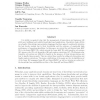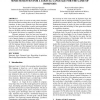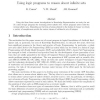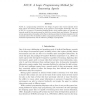830 search results - page 25 / 166 » Topological Reasoning and The Logic of Knowledge |
DLOG
2009
13 years 5 months ago
2009
In this work we summarize our recent results on extending Description Logics for reasoning about prototypical properties and inheritance with exceptions. First, we focus our attent...
JAIR
2007
13 years 7 months ago
2007
It is widely recognized today that the management of imprecision and vagueness will yield more intelligent and realistic knowledge-based applications. Description Logics (DLs) are...
AIA
2006
13 years 9 months ago
2006
Epistemic logic allows to reason not only about situations, but also about the knowledge that a set of agents have about situations. In later years, epistemic logic has been appli...
AMAI
2004
Springer
13 years 11 months ago
2004
Springer
Using the ideas from current investigations in Knowledge Representation we study the use of a class of logic programs for reasoning about infinite sets. Those programs assert code...
CORR
2004
Springer
13 years 7 months ago
2004
Springer
FLUX is a programming method for the design of agents that reason logically about their actions and sensor information in the presence of incomplete knowledge. The core of FLUX is...




